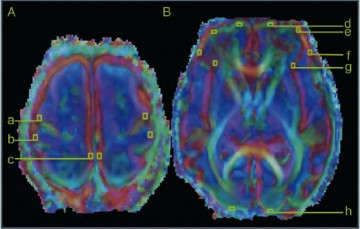Pre-term infants who grow more slowly as they approached what would have been their due dates also have slower development in an area of the brain called the cerebral cortex, according to researchers at UBC and the University of Toronto.

MRIs of an infant’s brain — one taken at birth, at 26 weeks gestation, and the other taken four weeks after birth. Letters point to areas of interest in this study.
Researchers, including Ruth Grunau, a Professor in the Department of Pediatrics and a Senior Scientist at the Child & Family Research Institute (CFRI), analyzed MRI brain scans of 95 pre-term infants born eight to 16 weeks too early at BC Women’s Hospital & Health Centre between 2006 and 2009. Infants were scanned soon after birth and a second time close to what would have been their due date, the ninth month of pregnancy.
These MRI scans allowed researchers to measure the pattern of water movement inside the brain, which normally changes between scans as the brain matures. The researchers also assessed the babies’ weight, length, and head size.
Their findings, published in Science Translational Medicine, showed that that pre-term infants with slower growth had delayed development in the cerebral cortex compared to those infants who grew more quickly between scans. The cerebral cortex is a two to four millimetre layer of cells that envelopes the top part of the brain and is involved in cognitive, behavioural, and motor processes.
“These results are an exciting first step because understanding the importance of growth in relation to the brain in these small babies may eventually lead to new discoveries that will help us optimize their brain development,” says Steven Miller, the study’s co-lead. Dr. Miller is head of neurology at The Hospital for Sick Children (SickKids), the Bloorview Children’s Hospital Chair in Paediatric Neuroscience, professor in the department of Paediatrics at the University of Toronto, affiliate professor in UBC’s Department of Pediatrics and an affiliate investigator at CFRI.
“More research needs to be done to understand what is the optimal growth rate for the brain development of these babies,” says Jillian Vinall, the study’s first author and a UBC PhD student co-supervised by Dr. Grunau and Dr. Miller.
“We’re especially grateful to the families for their generous and ongoing participation in this study,” says Dr. Miller. The researchers are following the babies through childhood to understand how pre-term brain development is associated with their neurodevelopment outcomes.
This work is supported by the Canadian Institutes of Health Research. Dr. Miller was supported by a Tier 2 Canada Research Chair in Neonatal Neuroscience and a Michael Smith Foundation for Health Research Scholar Award. Dr. Grunau is supported by a Senior Scientist Award from the Child & Family Research Institute. Jillian Vinall holds a CIHR Frederick Banting and Charles Best Canada Scholarship Masters & Doctoral Award, Pain in Child Health (CIHR Strategic Training Initiative in Health Research) trainee support and CFRI Graduate Studentship.